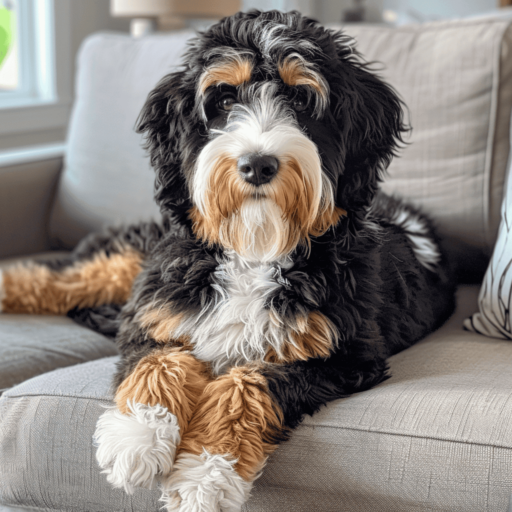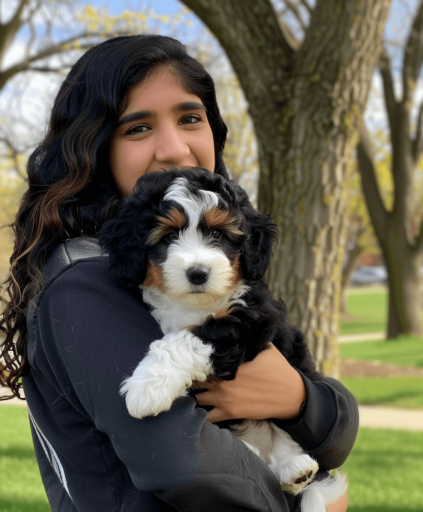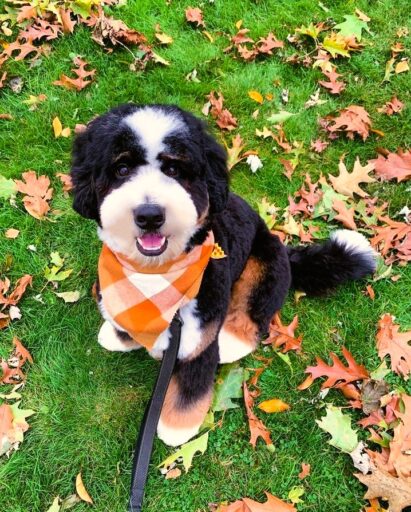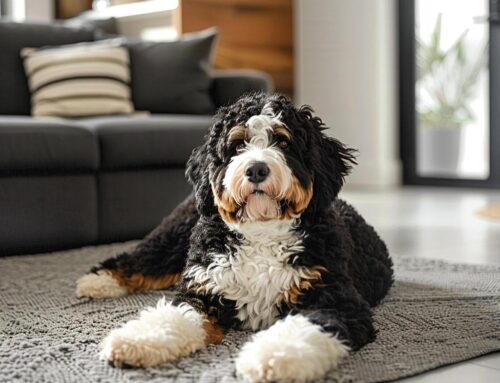Bernedoodles are a crossbreed between Bernese Mountain Dogs and Poodles that have gained popularity in recent years for their charming personalities and hypoallergenic coats.
Among various dog breeds, Bernedoodles stand out as a popular choice. However, like any dog breed, prospective pet owners should thoughtfully consider the pros and cons before introducing a Bernedoodle into their homes.
So what are the pros and cons of a Bernedoodle? Let’s explore common characteristics of Bernedoodles to help you make an informed decision.
What Is A Bernedoodle?

Bernedoodles are a mixed breed created by crossing Bernese Mountain Dogs with Poodles. This intentional crossbreeding aims to combine the desirable traits of both parent breeds. Bernese Mountain Dogs are known for their gentle and friendly nature, while Poodles are highly intelligent and hypoallergenic. By blending these characteristics, Bernedoodles often exhibit a loving temperament, intelligence, and a hypoallergenic coat.
While Bernedoodles are considered allergen-friendly, it is important to note that there is no such thing as a completely hypoallergenic dog breed.
They come in various sizes, including standard, miniature, and toy, depending on the size of the Poodle parent. Bernedoodles are recognized for their striking appearance, marked by a combination of the Bernese Mountain Dog’s distinctive tri-color coat and the Poodle’s curly or wavy hair. These dogs have gained popularity as family pets due to their friendly disposition and adaptability to various living environments.
Bernedoodle Pros: Gentle Nature and More
Bernedoodles boast many appealing qualities that make them increasingly popular among dog enthusiasts. A Bernedoodle puppy is known for its friendly and gentle nature, making it an excellent companion for families. The advantages of Bernedoodles include:
- Temperament – Bernedoodles are renowned for their friendly and gentle nature. Inherited from their Bernese Mountain Dog parent, they are typically affectionate, loyal, and great with families, making them excellent companions for children and adults alike.
- Low Shedding – One of the standout features of Bernedoodles is their hypoallergenic coat, which results from the Poodle genes. This low-shedding characteristic makes them suitable for individuals with allergies, as the minimal shedding reduces the amount of dander in the air.
- Intelligence – Poodles are known for their high intelligence, and Bernedoodles inherit this trait. These dogs are quick learners, making them easily trainable. Whether you’re teaching basic commands or more advanced tricks, Bernedoodles are likely to catch on quickly.
- Versatility – Bernedoodles come in various sizes, thanks to the range in sizes of Poodles used in breeding. This versatility allows potential owners to choose a Bernedoodle that fits their living situation, whether it’s a standard, miniature, or toy size.
- Adaptability – Bernedoodles tend to adapt well to various living environments. They can thrive in both apartments and houses as long as they receive the necessary exercise and mental stimulation. Their adaptability makes them suitable for a wide range of lifestyles.
- Exercise Needs – Bernedoodles, like very active dogs, require regular physical and mental stimulation. They need 30 to 60 minutes of exercise daily to stay happy and healthy. Given that Poodles, part of the Bernedoodle mix, are very active and need 60 to 120 minutes of exercise, it’s important to ensure your Bernedoodle gets enough activity.

Bernedoodle Cons: Grooming Needs and Other Challenges
While Bernedoodles possess numerous appealing qualities, it’s essential to consider potential drawbacks associated with this hybrid breed. Some notable Bernedoodle cons include:
- Grooming Needs – While the low-shedding coat is an advantage for allergy sufferers, it does require regular grooming. Bernedoodles, especially those with longer hair, need frequent brushing to prevent matting and tangling. Additionally, professional grooming may be required every few months, which can be a significant commitment in terms of time and money.
- Shedding Characteristics – Although Bernedoodles are considered low shedding and hypoallergenic, they still shed to some extent. Regular grooming is necessary to manage shedding and maintain their coat, similar to other shedding dogs.
- Health Concerns – Like many hybrid breeds, Bernedoodles can be prone to certain health issues inherited from their parent breeds. Common concerns include hip dysplasia, elbow dysplasia, and eye problems. Prospective owners should be prepared for potential veterinary expenses and be proactive in their dog’s health care.
- Exercise Requirements – Bernedoodles are moderate energetic dogs that require regular exercise to stay healthy and happy. If not given sufficient physical and mental stimulation, they may become bored and engage in destructive behaviors. Prospective owners should be committed to providing daily walks, playtime, and other activities to meet their exercise needs.
- Size Variability – While the variety in sizes can be an advantage, it can also be a challenge. Predicting the final size of a Bernedoodle can be difficult, and some owners may find that their dog ends up larger or smaller than expected. This can be a consideration for those with specific size requirements.
- Availability and Cost – Bernedoodles are a sought-after breed, and as a result, finding a reputable breeder may require patience. Additionally, the cost of a Bernedoodle can be higher compared to other breeds. Prospective owners should be prepared for potential waiting lists and budget considerations.
Table of Contents
Final Conclusion: Bernedoodle Pros and Cons
Bernedoodles are a delightful and versatile breed that brings joy to many families. However, like any breed, they come with their set of challenges and considerations. Owning a Bernedoodle involves understanding their energetic nature, grooming requirements, and the importance of regular veterinary checkups.
As a potential owner of a Bernedoodle, you should carefully weigh the Bernedoodle pros and cons to determine if the dog would be the right fit for your lifestyle and preferences. Compared to purebred dogs, Bernedoodles offer a unique blend of characteristics but also come with their own set of advantages and disadvantages.
Choosing to work with a reputable Bernedoodle breeder can help address any concerns about the health and size of your Bernedoodle.
With proper care, training, and attention to their unique needs, owning a Bernedoodle can make a wonderful and loving addition to your household.









